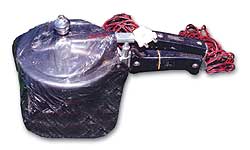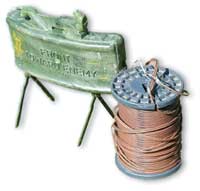 Nepal's Maoist insurgency is turning into a landmine war, worrying peace activists who say this is going to put many more non-combatants at risk. Like 11-year-old Min Bahadur Lama who was walking home from school during tiffin-break last
Nepal's Maoist insurgency is turning into a landmine war, worrying peace activists who say this is going to put many more non-combatants at risk. Like 11-year-old Min Bahadur Lama who was walking home from school during tiffin-break last week when a roadside pressure cooker bomb planted by Maoists went off, ripping his tiny body apart.
Both the Royal Nepali Army and the Maoists are using mines or improvised explosive devices: the army to protect the perimeter of its garrisons and installations, while the Maoists use wire-detonated pressure cookers packed with explosives to target passing military vehicles with devastating effect like they did in the attack on a truck carrying Brig-Gen Sagar Bahadur Pande near Bhaise last week.
Tighter security around bases has meant that the Maoists are now using Iraq-style tactics to blow up military vehicles on lonely roads and attack vulnerable personnel at security checkpoints. Many mountain roads to remote parts of Kabhre, Sindhupalchok and Dhading are blocked by Maoist landmines to limit the army's mobility. "Hidden explosives have now emerged as a major threat to the safety of civilians in the districts," says Purna Shova Chitrakar of the Nepal chapter of the International Campaign to Ban Landmines.
 Of the 202 people who died in explosions last year, 52 were civilians and a quarter of the non-combatants killed were children. From January-September this year, anti-landmine activists have recorded 55 deaths due to different types of explosions. Of them, 28 were security personnel and eight were children. "The decrease in fatalities this year does not mean there has been a decline in the use of mines, in fact there has been an increase," Chitrakar told us. Because most Maoist boobytraps are wire-controlled, they can be aimed specifically at a military target, while the army's pressure bombs can kill anyone who steps on it.
Of the 202 people who died in explosions last year, 52 were civilians and a quarter of the non-combatants killed were children. From January-September this year, anti-landmine activists have recorded 55 deaths due to different types of explosions. Of them, 28 were security personnel and eight were children. "The decrease in fatalities this year does not mean there has been a decline in the use of mines, in fact there has been an increase," Chitrakar told us. Because most Maoist boobytraps are wire-controlled, they can be aimed specifically at a military target, while the army's pressure bombs can kill anyone who steps on it. The military admits villagers have been killed by its mines when they strayed too close to the perimeter of a base, but says it takes precautions to prevent civilian casualties. Army spokesman Deepak Gurung defends the use of mines: "In a war like this where hundreds of guerrillas try to storm a base manned by a few soldiers, mines are the only defence."
The army at present uses anti-personnel and anti-vehicle mines made in China, India and Russia. The Maoist explosive devices are mostly homemade, but the army says it has captured piped gelatin 'Superdyne' explosives manufactured at Rourkela, India.
Both the government and Maoists have assured anti-landmine activists that they will limit the use of these indiscriminate explosives. "But neither have really done anything about it," says Chitrakar. Nepal is not among the 134 countries that have ratified the Ottawa Protocol which requires governments not to use landmines.


